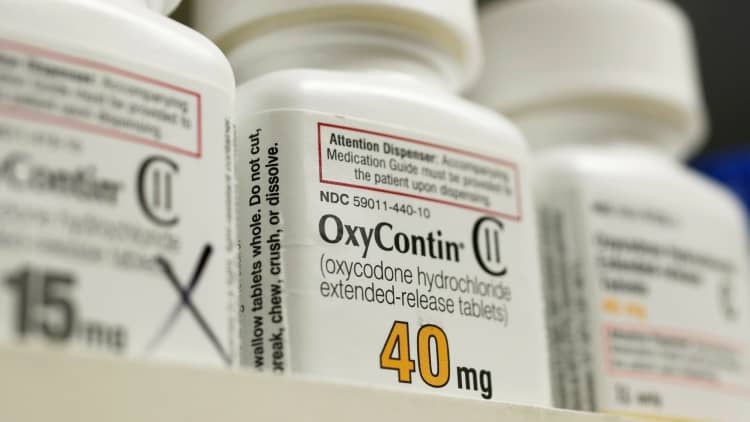Shares of drug distributors fell Tuesday after a report said McKesson, Cardinal Health and AmerisourceBergen have proposed paying $10 billion to settle claims they helped to fuel the U.S. opioid epidemic.
The companies made the verbal proposal as part of talks with a group of state attorneys general, according to Bloomberg, citing three people familiar with the offer. The National Association of Attorneys General, which is the handling talks on behalf of several states, countered with a demand for $45 billion to cover costs from the crisis, the report said.
Whether the drug distributors and attorneys general can agree to a deal remains uncertain, according to the report.
Shares of the drug distributors, which deliver the majority of prescription medications to U.S. pharmacies, fell Tuesday. McKesson closed down 3.9%, Cardinal Health dropped 5.8% and AmerisourceBergen shed 5.2%.

Mallinckrodt, the largest manufacturer of oxycodone and hydrocodone pain pills, closed down 12%. The company said earlier Tuesday it would suspend its plans to spin out its generics unit, which includes opioids. Mallinckrodt previously had said the spinout would separate its main business from any potential liabilities from opioid litigation. Company executives Tuesday cited "uncertainty around that opioid litigation" leading to its "decision to suspend, for now, the spin plans."
The report comes as some 1,600 cases against OxyContin maker Purdue Pharma and other opioid manufacturers are being consolidated and transferred to a judge in the Northern District of Ohio. The companies have asked for a delay for the trial set in October.
Lawyers have compared the opioid litigation to the tobacco master settlement agreement in the mid- and late-1990s where the nation's four largest tobacco companies reached a group settlement with 46 state attorneys general.
In a statement to CNBC, McKesson said, "We regularly engage with the state attorneys general, but the company has made no settlement offers."
Cardinal Health and AmerisourceBergen declined to comment.
The opioid epidemic is a major issue for the federal government, which has vowed to crack down on illicit use. More than 130 people in the U.S. die every day from opioid overdoses, with about 47,000 people dying in 2017, according to data from the U.S. Centers for Disease Control and Prevention.
In March, Purdue, and its owners, the Sackler family, agreed to pay $270 million to Oklahoma to settle a lawsuit accusing the drugmaker of ruthlessly marketing and misleading the public about OxyContin. As a part of that agreement, Purdue agreed to contribute $102.5 million to fund the creation of a National Center for Addiction Studies at Oklahoma State University.
— CNBC's Meg Tirrell contributed to this report.
WATCH: Why museums now refuse millions from the family behind Purdue Pharma



